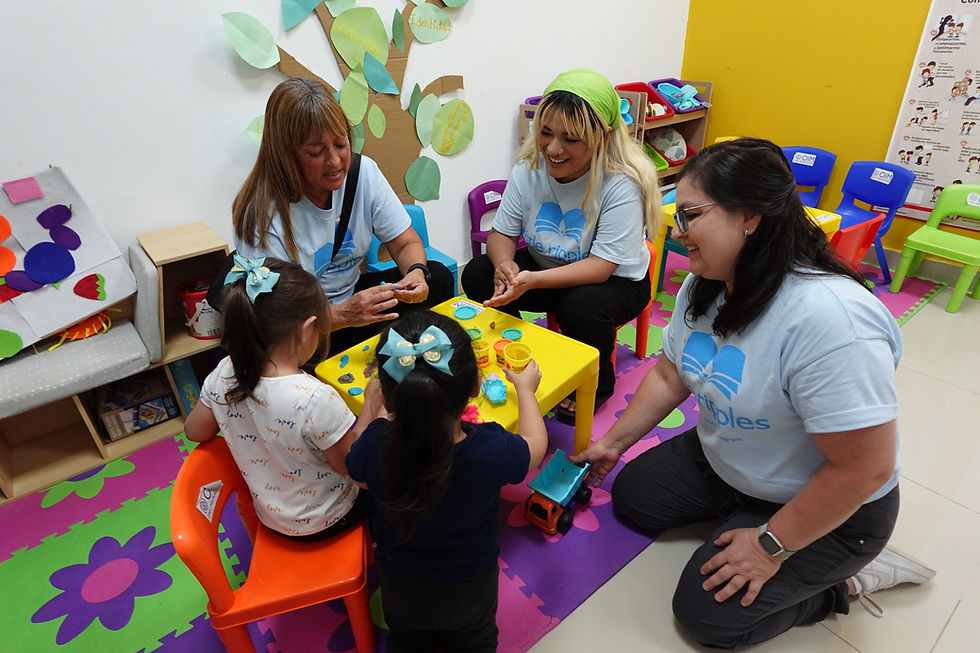Listening Makes all the Difference
- iACT
- Jun 3, 2019
- 3 min read
Updated: Feb 19, 2024
Mothers and children find a spot on the thatched mats laid out in the shade of the school where we’ve organized for the Little Ripples assessment in refugee camp Mile (mee-lay), eastern Chad. It’s loud as Souliman begins the registration process. Women are chatting and children are playing, despite their mother’s best efforts to settle them down. We decide this is the perfect moment to pause and sit with the mothers. Our intention is to give thanks for their time and presence, and offer an opportunity for the mothers to sit together (as they say in mindfulness speak) and share any thoughts, ideas, and needs with us before we engage them in our lengthy survey.
Traca Gress, iACT Mindfulness advisor, leads them through mindfulness practice. While the children practice mindfulness every day at Little Ripples, for the mothers, it’s their first time. Traca keeps it simple. For just a few minutes, she asks the women to focus on the weight of their body on the ground and to begin to feel the stillness. Then, she asks them to notice the breath in their nose, chest, and belly. When thoughts come, “notice them then let them go,” she says, “and come back to your breath.”
The space is now quiet. Most mothers have their eyes closed. Children are sitting quietly, looking on and listening. It’s a beautiful moment. It feels overwhelming. Here we all are, so present and all together.
Then, at the sound of the chime, eyes are open again and the women quietly and shyly smile at each other, and us. Traca, with wide-eyes and a big and gentle smile on her face, asks if any of the women would like to share any reflections or thoughts. We hear responses about the mindfulness. Then, without prompting, the conversation naturally opens up to their children and Little Ripples. Following the mindful moment together, the women have a lot to express, and I record as much as I can.
“Before, other organizations provided preschool but they just focused on quantity. They register many, many children but the children they don’t learn, and they are out on the road and nobody is taking care. Really, the teachers of Little Ripples do their work well. They register fewer children, but they follow the children and the children learn. And an extra benefit is they receive food. Now when the child comes back to the house, we offer food and the child says, ‘no I receive food at school.’ We need more centers because, for example, one mother has many children. We need centers so all our children can benefit. At Little Ripples children have joy, fun, food, and learning. So, please see how we can find for more Little Ripples centers.” – Nada, a mother of a Little Ripples preschool student in refugee camp Mile, eastern Chad

“We are facing a lot of difficulties for how we live, but the most important thing for us is education. We want all our children to learn and study.” – Sittador, mother Little Ripples student in refugee camp Mile, eastern Chad.

“As you can see we need food. We face malnutrition. We need food and education. Please continue this program and bring it to all our children.” – Mother Little Ripples student in refugee camp Mile, eastern Chad

It’s 10:00 AM and we need to start assessments if we’re going to complete them all in the next few days. Oumda calls for one more. A woman named Mahboula speaks.
“I have to thank iACT. The meals and the learning we receive is perfect. I asked my neighbors and I learned that iACT is not everywhere. But really you should expand the program. The meals are helping the brains and bodies of our children.” – Mahboula, mother of a Little Ripples student in refugee camp Mile, eastern Chad

It’s hard to wrap it up. But I thank the women. I thank the women for sharing their time, ideas, and suggestions, and I let them know that what is most important to iACT is that we, as an organization, listen — that we listen to each of them, always. “We take everything you say to heart. We share it with the world, and what you tell us and share with us informs how we do our work with you and your community. It’s so important to us that we listen to you.”
I slowly begin to walk toward the classroom for assessments, my mind already on the next task at hand, and then, I smile. From the women still sitting on the mats, I hear the repetition of, “iACT, iACT.” They are helping each other learn the name of our organization — the name of the family they are a part of, too.


